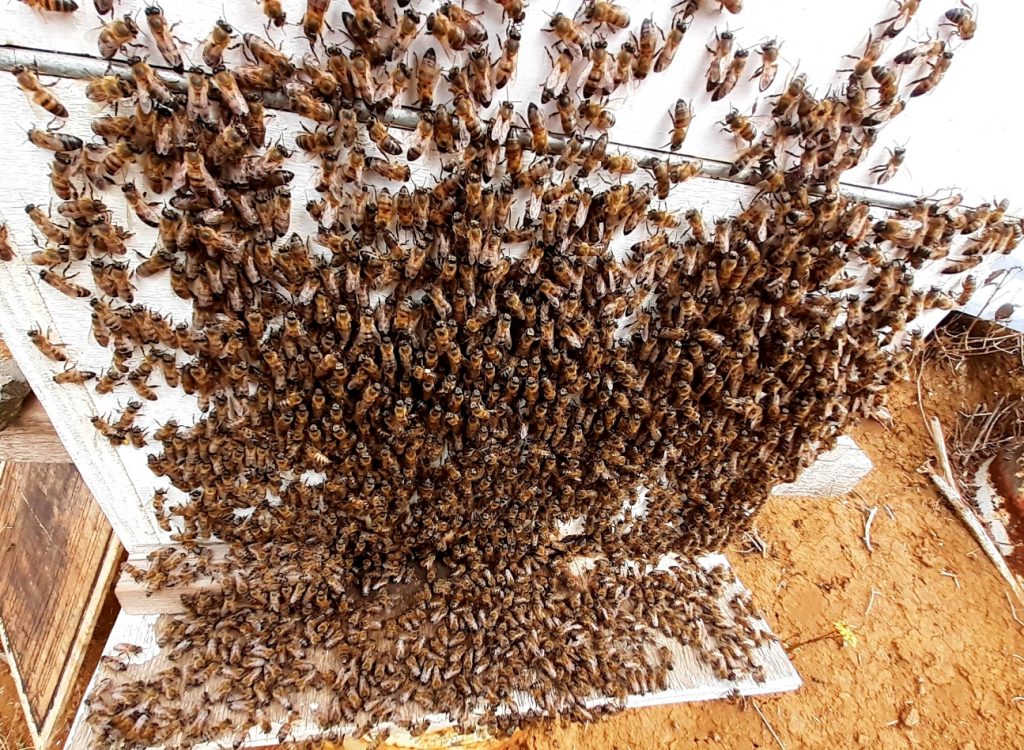20 May 2021
- 20 May is World Bee Day
- Bees play a vital role in our lives
- The St Helena Bee Project explores where our bees come from
Today is World Bee Day. Observed on 20 May each year by the United Nations, World Bee Day raises awareness of the importance of bees and beekeeping.
Bees, as one of the major pollinators, ensure food and food security, sustainable agriculture and biodiversity as well as significantly contribute to the mitigation of climate changes and environmental conservation. In the long-term, protecting bees and the beekeeping sector can help reduce poverty and hunger, as well as preserve a healthy environment and biodiversity*.
About one third of the food we eat requires pollinators, so bees play a vital role in our lives.
The St Helena Bee Project
The St Helenian Bee is special on several fronts – we don’t actually know what it is and they have been introduced several times over the years, as important pollinators of crops, from Europe, the UK (queens from the Isle of Wight), and Africa, creating a sub-species mix-up.
Recent research (bee wing morphometry) carried out by the Veterinary Service and the St Helena Bee Keepers Association identified that the St Helenian Bee has drifted a long way from the true Honey Bee. It is therefore worth knowing what sub-species of bee we have. Looking to the future it gives the Island a Unique Selling Point whether it be selling organic honey from disease-free bees, or exporting queens to invigorate overseas genetics. Secondly, it is possible that we have our own hybridised bee.

Local stringent biosecurity procedures for bees, bee products and bee equipment has also ensured that our bee populations are protected and not threatened by many serious pests and diseases that are wiping out bee populations around the world.
Ultimately what this all means is a premium on the Island’s bee products, just as is the case with Island coffee. And to this effect, Honey and Honey Bees are included in the Sustainable Economic Development Plan 2018-2028 as a potential new Export Sector. With local bees free of the major diseases that cause significant damage to bee colonies coupled with the genetic make-up or simply the disease free attribute of the St Helena bee this may have value internationally and could provide export opportunities. The disease free nature of St Helena’s honey also makes it one of the purest in the world.
So what are we doing to find out more about our bees?
Senior Veterinary Officer, Joe Hollins, says that the only way to take this forward is to explore bee DNA – which is where the St Helena Bee Project comes in.
Under the Project 70 bees have been sent to the renowned FERA Ltd (formerly the Food and Environment Research Agency in the UK) and analysis is underway looking at both mitochondrial DNA and nuclear DNA to explore the origin and ‘distinctiveness’ of the Honey Bees on St Helena. The laboratory has extracted DNA from 60 St Helena bees (10 extra were provided as a back-up), and 30 comparative bees from Southern Africa. Comparative analyses are being performed for sub-species identity, geographic origin, population sub-structuring and genetic diversity within St Helena.
The beekeepers of the Island assisted with the Project and the 70 bees were collected from separate hives. Each were individually preserved in 99.8% ethanol. The St Helena Bee Project was assessed and issued a licence by the St Helena Research Council.
Do we have our own unique Island race of bees, or has one sub-species come to dominate? Soon, we should know.
In the meantime, let’s recognise the importance of our Honey Bee and enjoy the delicious pure honey they produce.
*Source – Worldbeeday.org
#StHelena #StHelenianBee #HoneyBee #WorldBeeDay
https://www.facebook.com/StHelenaGovt/
SHG
20 May 2021